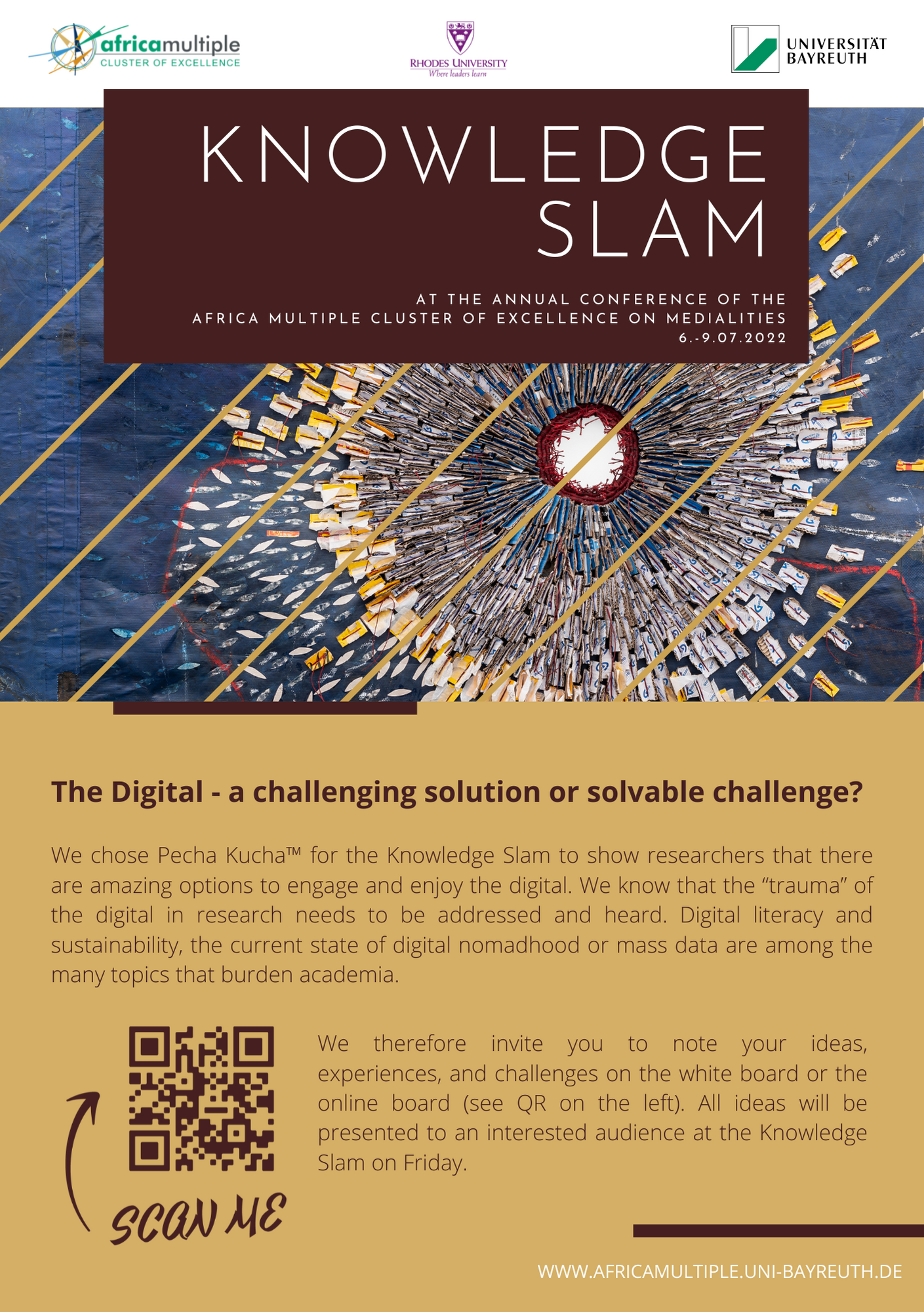News
Conference Medialities: Knowledge Slam
01.07.2022

The Digital - a challenging solution or solvable challenge?
Or simply put: Invite people to engage and enjoy the digital.
The Knowledge Slam has chosen Pecha Kucha™, a particular presentation format established in Japan, to allow researchers to present their academic work in projects, their experience, ideas and struggles. Pecha Kucha™ visualises and prompts the viewer to think in new ways about the digital in academia, and we hope it invites researchers to engage and enjoy the digital, too. We are particularly interested the exchange of ideas regarding how the digital can impact, expand and even enhance the way academic research is done today. Or simply put: Invite researchers to engage and enjoy the digital.
Seven presentations will introduce the audience to a visualisation of the digital across various topics: from archives, photography, publications, and memories, to digital concepts such as fluid ontologies or the options of a digital market place and sustainability as offered in the DRE.
Abstracts for the Knowledge Slam
Dr. Katharina Fink / Sipho Ndlovu
Kofifi’ - the Sophiatown Digital Archive - A radical, community-curated digital platform for imagining Sophiatown’s past, present, and future
Sophiatown, the iconic working-class suburb of Johannesburg, immortalized in art and popular culture, is a popular prism through which the history of segregation, forced removals, and Apartheid can be revisited. Equally, it represents the radical potential for living as diverse communities in a post-Apartheid city. In an extensive community research project, researchers, artists, and activists assembled a collection of analog and digital data, from images to maps. We want to consolidate this material into a community-curated, responsive, safe, and accessible digital archive with societal impact. As an open portal for public history, this community-curated, web-based archive will be a landmark for decolonial archival work, serving a variety of users — from local citizens to researchers, artists, and healers across the globe.
- For more info please visit: https://www.nwo.nl/en/projects/48120149
‘’’’’’’’’’’’’’’’’’’’’’’’’’’’’’’’’’’’’’’’’’’’’’’’’’’’’’’’’’’’’’’’’’’’’’’’’’’’’’’’’’’’’’’’’’’’’’’’’’’’’’’’’’’’’’’’’’’’’’’’’’’’’’’’’’’’’’’’’’’’’’’’’’’’’
Dr. Gibson Kimutai
Towards a Sustainable Digital Repository Environment
The ambitious goal to build a DRE for all the clusters provides unique opportunities for researchers across the partner institutions. Sustaining the DRE remain the single most activity going into the future. In this talk, i will propose guidelines achieving sustainability of the DRE.
- For more info please visit: https://www.researchgate.net/profile/Gibson-Kimutai
‘’’’’’’’’’’’’’’’’’’’’’’’’’’’’’’’’’’’’’’’’’’’’’’’’’’’’’’’’’’’’’’’’’’’’’’’’’’’’’’’’’’’’’’’’’’’’’’’’’’’’’’’’’’’’’’’’’’’’’’’’’’’’’’’’’’’’’’’’’’’’’’’’’’’’
Frédérick Madore
Publishing the Islam Burkina Faso Collection with Omeka S
Despite the growing popularity of digital humanities, a limited number of initiatives related to Islam in Sub-Saharan Africa have attempted to mobilize digital tools to analyze and disseminate research data. Launched in 2021, the Islam Burkina Faso Collection (https://islam.domains.uflib.ufl.edu/s/bf/) is an open-access digital database published by the LibraryPress@UF, which contains more than 3,100 archival materials, newspaper articles, Islamic publications, photographs and bibliographical references related to Islam and Muslims in Burkina Faso. “Digital exhibits” with interactive timelines, which include a selection of documents from the database, contextual information for approaching this material and a selective bibliography, serve as entry points for the larger collection. In the medium to long term, the Islam Burkina Faso Collection will be part of a larger collaborative digital database on Islam in West Africa, which will include material that Frédérick Madore has already digitized as part of his research on Côte d’Ivoire, Benin, and Togo.
‘’’’’’’’’’’’’’’’’’’’’’’’’’’’’’’’’’’’’’’’’’’’’’’’’’’’’’’’’’’’’’’’’’’’’’’’’’’’’’’’’’’’’’’’’’’’’’’’’’’’’’’’’’’’’’’’’’’’’’’’’’’’’’’’’’’’’’’’’’’’’’’’’’’’’’
Prof. Mirco Schönfeld
Context and Ontologies: Creating a fluid knowledge base
Can fixed ontological hierarchies flow out of rigidity and still serve as a reliable knowledge base? Let's consider a contextualized knowledge graph!
- For more info please visit: https://mircoschoenfeld.de/
‘’’’’’’’’’’’’’’’’’’’’’’’’’’’’’’’’’’’’’’’’’’’’’’’’’’’’’’’’’’’’’’’’’’’’’’’’’’’’’’’’’’’’’’’’’’’’’’’’’’’’’’’’’’’’’’’’’’’’’’’’’’’’’’’’’’’’’’’’’’’’’’’’’’’’’
Abrie Fourie
- For more info please visit: http://www.abriefourie.com/info.html
‘’’’’’’’’’’’’’’’’’’’’’’’’’’’’’’’’’’’’’’’’’’’’’’’’’’’’’’’’’’’’’’’’’’’’’’’’’’’’’’’’’’’’’’’’’’’’’’’’’’’’’’’’’’’’’’’’’’’’’’’’’’’’’’’’’’’’’’’’’’’’’’’’’’’’’’
Dr. Jae Sook Cheong
DRE as a market place
In the data bank of the DRE market place, exchange your data for more valuable data across disciplines, and enrich your research insights.
- For more info please visit: https://www.africamultiple.uni-bayreuth.de/en/People-_-Organization/Organization/index.html
‘’’’’’’’’’’’’’’’’’’’’’’’’’’’’’’’’’’’’’’’’’’’’’’’’’’’’’’’’’’’’’’’’’’’’’’’’’’’’’’’’’’’’’’’’’’’’’’’’’’’’’’’’’’’’’’’’’’’’’’’’’’’’’’’’’’’’’’’’’’’’’’’’’’’’’’
Dr. Anke Schürer-Ries / Alexandra Kuhnke, M.A.
The Digital – a challenging solution or a solvable challenge?
Having collected many thoughts on the digital, we aim to address the questions and ideas, worries and solutions in conjunction with the ‘trauma of the digital’, and how it can be reduced in academia. We would like to encourage researchers to engage with and enjoy the digital.
- https://www.africamultiple.uni-bayreuth.de/en/People-_-Organization/Organization/index.html
- https://www.iwalewahaus.uni-bayreuth.de/de/team/internals/Kuhnke/index.html
‘’’’’’’’’’’’’’’’’’’’’’’’’’’’’’’’’’’’’’’’’’’’’’’’’’’’’’’’’’’’’’’’’’’’’’’’’’’’’’’’’’’’’’’’’’’’’’’’’’’’’’’’’’’’’’’’’’’’’’’’’’’’’’’’’’’’’’’’’’’’’’’’’’’’’’’

